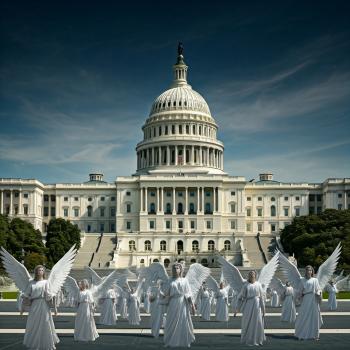Richard John Neuhaus, the neoconservative intellectual and editor of the journal First Things, thought that adherents of “dominion theology” were nutty, but he did not think they were inconsequential.
In his May 1990 article “Why Wait for the Kingdom? The Theonomist Temptation,” Neuhaus introduced the prominent players and prominent ideas in play among the “theonomists” or “reconstructionists” or “theonomic reconstructionists” — the gothic Presbyterian wing of dominion theology or dominionism.
Dominion theology also has a creepy Pentecostal wing, the so-called “New Apostolic Reformation” which takes a very different route — more Peretti-esque “spiritual warfare,” less ultra-Calvinism — to arrive at a very similar millennialist political and theological agenda. Neuhaus here is writing before the rise of that branch of dominion theology, although he foresaw its arrival in the growing influence of theonomic reconstructionist doctrine among influential Pentecostals such as Pat Robertson.
Neuhaus’ tone in the piece is glibly dismissive and a bit condescending, but that’s just how Neuhaus wrote about everyone he disagreed with. He did not lightly dismiss what he viewed as the very real danger of the dominionists’ very real and growing influence.
Neuhaus begins with a brief introduction of some of the main personalities and a pithy summary of their shared ideology:
The theonomic movement is in some ways small, with perhaps no more than a dozen prominent representatives. Its influence, however, is disproportionate to its size, and familiarity with its personalities, positions, and purposes is important to understanding the ways in which some fundamentalists and evangelicals are making the connections between religion and public life. …
… To date the leadership of the theonomist movement is the trinity of [Rousas John] Rushdoony, [Gary] North, and [Greg] Bahnsen. Other prolific writers in the movement are David Chilton, Gary DeMar, George Grant (not the distinguished Canadian philosopher), and, at least until recently, James Jordan. In truth, “prolific” is hardly adequate to suggest the veritable flood of publications from these writers. …
Most other Christians … are conventionally given to saying that the Bible contains “no blueprint for the right ordering of society.” That is precisely what the theonomists deny. In fact, one set of books is called “The Biblical Blueprint Series,” and it is nothing if not specific. The determining proposition is that the Mosaic law given at Sinai was not just for Israel but is God’s design for all nations of all times. … As most of the proponents of this viewpoint do not hesitate to say, a theonomic social order is a theocratic social order, and a theocratic social order is a Christian social order. (Some theonomists prefer “Christocracy” to theocracy.)
Bible law requires a radical decentralization of government under the rule of the righteous. Private property rights, especially for the sake of the family, must be rigorously protected, with very limited interference by the state and the institutional church. Restitution, including voluntary slavery, should be an important element of the criminal justice system. A strong national defense should be maintained until the whole world is “reconstructed” (which may be a very long time). Capital punishment will be employed for almost all the capital crimes listed in the Old Testament, including adultery, homosexual acts, apostasy, incorrigibility of children (meaning late teenagers), and blasphemy, along with murder and kidnapping. There will be a cash, gold-based economy with limited or no debt. These are among the specifics broadly shared by people who associate themselves with the theonomic viewpoint.
That’s an extreme agenda, but the details — extreme social conservatism, gold-buggery, economic lawlessness — may be a bit familiar. Those extreme ideas are more mainstream today than they were when Neuhaus published this article in 1990.
Neuhaus wasn’t wrong about dominion theology’s “disproportionate” influence.
He continues about the political agenda of the theonomists:
Some Reconstructionists express resentment of the way their critics focus on their view of capital crimes in connection with Bible law. … It seems hardly surprising that such views should attract considerable attention, but those who hold them insist that the attention is exaggerated. They point out that they are not advocating the death penalty today to punish, for example, homosexual acts. Their proposal would be applicable, they point out, only in a reconstructed society that may be thousands of years away. And in a reconstructed society the level of righteousness will be such that capital crimes will be almost unheard of.
To which the critics of theonomy might respond that the time factor is quite irrelevant. In their view we should resist taking the first step toward a destination whose distance makes it no less grotesque. And the assurance that very few people will be stoned to death for apostasy, for example, is small comfort for those who think that apostasy does not belong in the criminal code at all.
A reconstructed world ruled by future Rushdoonyites will not, needless to say, be democratic. Rushdoony is straightforward in condemning democracy as a “heresy.” … His opposition to democracy and any form of legally protected pluralism is enprincipled, as it should be in the argument of a reflective theocrat. The free exercise of religion, for example, must be only for the free exercise of true religion. As Rushdoony says, “The right have rights,” thus echoing the Roman Catholic dictum of an earlier day that “error has no rights.”
Again, this is all pretty horrifying, but if you’ve been paying attention at all to the tea party or to Glenn Beck and his former colleagues at Fox News, then this is all also pretty familiar. When Neuhaus was writing this 20 years ago, David Barton was a small-time conman swindling one congregation at a time with his bogus histories and his theories about freedom of religion applying only to “true religion.” Now Barton — still telling the same outrageous, brazen lies — is a respected TV commentator and a political advisor to several of the leading GOP contenders for their party’s nomination for president.
Neuhaus was not wrong about the dominionists’ disproportionate influence.
Theonomy would no doubt strike most Americans as a particularly outlandish and easily dismissable effluent of fundamentalist fanaticism. Others might, not without reason, view it as an alarmingly dangerous development. Of course the influence of theonomy is not so great as its advocates suggest, but it is not inconsiderable, and it is growing. …
Theonomy currently shapes a good deal of conservative Christian writing on the Constitution and the moral basis of law. Its real growth market, however, may be among charismatic and pentecostal Christians who are the chief constituency of, among others, Pat Robertson. As is the way with ideas, theonomist doctrine has insinuated itself in circles where people would be not at all comfortable to think of themselves as theonomists. …
Bingo.
Twenty years later, dominionist doctrine has insinuated itself into many more circles where people are not only uncomfortable thinking of themselves as dominionists, the very word makes them recoil in horror.
And after recoiling, it makes them reflexively write disingenuous and deeply weird denials that dominionism even exists or that it has any influence at all over anyone or that liberal journalists are just making the whole thing up and overreacting.
The Herescope blog has been collecting these disingenuous denials — including contributions from Pat Robertson, from his former lieutenant Ralph Reed, and from Joe Carter, Web editor of the journal Neuhaus founded.
Carter’s is particularly disingenuous. Here is Carter, writing, mind you, on First Things‘ website:
First, there is no “school of thought” known as “dominionism.” The term was coined in the 1980s by [Sara] Diamond and is never used outside liberal blogs and websites. No reputable scholars use the term for it is a meaningless neologism that Diamond concocted for her dissertation.
And here, again, is Carter’s late boss, Fr. Neuhaus, writing for First Things in 1990:
Although their analysis of the shape of the world is typically bleak, the theonomists insist that the kingdom is now, if only the true believers have the boldness to take dominion (hence “dominion theology”).
The quote from Carter above comes from a long, contemptuous post ridiculing Ryan Lizza for suggesting in The New Yorker that Francis Schaeffer was ever associated with dominion theology or in any way influenced by it.
Here, from the Aug./Sept. 2001 issue of First Things, is an article on “The Passing of R.J. Rushdoony“:
I first encountered Rushdoony at L’Abri, a Christian community high in the Swiss Alps. The year was 1964. Francis Schaeffer, the founder and director of L’Abri, had recently come across a little book by Rushdoony called This Independent Republic: Studies in the Nature and Meaning of American History, and he made it the basis for a seminar with the students at L’Abri. We gathered in the living room of Chalet les Mélèzes, where most of the community’s meetings were held. …
The topics covered in the Rushdoony book were wide–ranging. The chapter that Schaeffer chose for the subject of his seminar focused on the difference between the American and the French Revolutions. … Rushdoony challenged the propriety of calling America’s defensive war against Great Britain a true revolution. According to him it was instead a “conservative counterrevolution,” whose purpose was to preserve American liberties from their usurpation by the British Parliament. It owed nothing to the Enlightenment. By contrast, the French Revolution was the direct result of the Enlightenment, along with the organizational strategies fostered by various secret and esoteric societies. …
Schaeffer later did come to realize that Rushdoony’s “theonomic reconstructionism” …
Wait. This is a “liberal blog,” right? So here I’m allowed to follow Richard John Neuhaus’ left-wing example and use the shorter, more inclusive term “dominionism,” right? Let me do that, then.
Schaeffer later did come to regard Rushdoony’s brand of dominionism as kooky and dangerous. But that muddled antipathy for the Enlightenment will certainly sound familiar to anyone who has read Schaeffer’s How Shall We Then Live? or A Christian Manifesto. Far too familiar for me to take seriously any of these critiques of Lizza’s article expressing disingenuous dismay over his seeing a connection between Schaeffer and the dominionists. (Other commonalities: Both Francis Schaeffer and the theonomists were fond of garbling Kuyper and Van Til, although in slightly different ways.)
The main difference between dominion theology in 1990 and dominion theology today is that 20 years ago, the dominionists were eager to exaggerate their influence. Today, having achieved much greater influence, they are eager to deny it.
Neuhaus noted in 1990 that “the proponents of this viewpoint do not hesitate to say, a theonomic social order is a theocratic social order, and a theocratic social order is a Christian social order.”
But today they do hesitate to say that.
And they hesitate to admit that they ever said that.
Or that anybody ever said that.
And they’ve got people like Joe Carter and Doug Groothuis and Larry Ross lining up to write weird little screeds affirming that this was never said and that when it was said no one was listening and besides R.J. Rushdoony and C. Peter Wagner are just figments of Sara Diamond’s imagination.
And they’ve got warped, soul-shriveled trolls in my comment section dismissing a 20 year old article in a respected conservative journal as something libruls just made up out of thin air “a month ago” while refusing to engage any of the substance of the article.
But “a theocratic social order” was what they said in 1990 and they meant it then.
And they mean it still, even if they’ve become savvier about saying it quite as bluntly or honestly. Dominion theology is not a myth. It remains relatively small, but it is larger than it was in 1990.
And its ongoing influence continues to be, as Neuhaus said, disproportionate.















